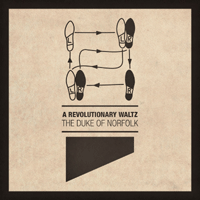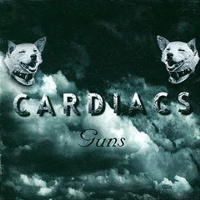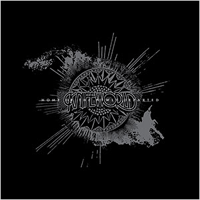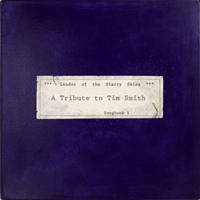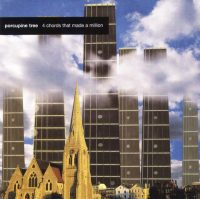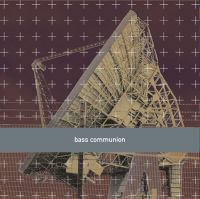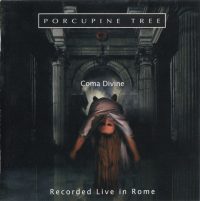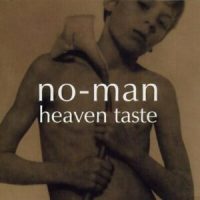I can tell I’ve not kept my eye on the ball – nothing makes a person feel less alert than suddenly finding that three of his favourite musical projects (plus one new recent favourite and one older interest) are suddenly pouncing out new releases and. I step out for a moment, for another writing project, and someone moves all of the furniture around.
So… let’s start with news of fresh work from The Duke of Norfolk, a.k.a transplanted Oklahoman folkie Adam Howard, now resident in Edinburgh. He’s currently offering a free single – A Revolutionary Waltz – in part-promotion, commenting “I am launching a Kickstarter project in two weeks to fund the making of a live video EP, and would like to give you this recording in the meantime. It’s just a wee sonic experiment, but I hope you enjoy it!”If you’re wondering whether there’s a Scottish Nationalist tie-in here, given recent political events in Britain, Adam’s adopted hometown, and that beautifully sympathetic and country-tinged setting of Robbie Burns’ Ae Fond Kiss on which he duets with Neighbour, think otherwise. In fact, this song is a darker cousin to An Evening Waltz (from his 2013 album ‘Le Monde Tourne Toujours’): a foreboding meditation on the inexorable turn of fate’s wheel, tying together three histories of power, betrayal and fall. Despite its timeless trad-folk lyric, Adam’s busking roots (and the lusciously acoustic sound of much of his other material) it’s also a rough-and-ready take on digital folk, either demo-rough or intended to display Adam’s other roots in sound design. A clipped electrophonic waltz picks its way across a murky psychedelic smudge and a droning feedback pibroch: its characters sea-waltz to the grim, dry beat of a hand drum and a scattering of cowrie-shell percussion. It’s well worth a listen. As for progress on the Duke Of Norfolk video Kickstarter campaign, it’s probably best to keep tabs on his Facebook page.
Following the success of their double vinyl LP reissue of 1995’s ‘Sing To God‘ album, Cardiacs are doing the same with its 1999 follow-up, ‘Guns’. While it’s not the magnificent sprawler that ‘Sing To God’ is, ‘Guns’ offers a more concise take on the pepper-sharp 1990s Cardiacs quartet that featured Bob Leith and gonzo guitarist Jon Poole alongside the band-brothers core of Tim and Jim Smith. As Cardiacs albums go it’s an even brasher beast than usual, hiding its gnarly depths under brass-balled upfront confidence and strong seasonings of glam-bang, pell-mell punk, whirring Krautrock, and jags of heavy metal looning.‘Guns’ is also one of the most obscure Cardiacs works. Drummer Bob joined Tim on lyric duties, helping to turn the album’s words into a dense hedge-witch thicket of allusion and play, in which typically naked Cardiacs preoccupations (dirt, wartime, suspicion, indeterminate life and death) are tied up into an almost impenetrable web, driven along by the music’s eight-legged gallop. The fact that Tim and Bob were slipping in random borrowings from ‘English As She Is Spoke‘, a notoriously bungled Victorian phrasebook with its own wonky and unintentional poetry, only added to the tangle.
You can pre-order the ‘Guns’ reissue here for end-of-June shipping. It’s a single vinyl record, with no extra thrills or treats, but does come with the promise of beautiful packaging and pressing. You can expect to hear news on more Cardiacs reissues over the next few years. The current plan is to reissue the band’s whole back catalogue on vinyl after years of exile (predominantly spent huddled exclusively on iTunes).
Meanwhile, see below for a taste of ‘Guns’ magnificent oddness. Here’s the grinding drive of Spell With A Shell (which encompasses the lives of pets, the terror and wonder of transformation, and the cruelty, loneliness and confused loyalties of childhood). Here’s a collision of outsider folk and reggae in Wind And Rains Is Cold (via a fan video of clips from ‘Night Of The Hunter’, from which Cardiacs frequently filch scraps of lyric). Finally, here’s the scavenged, scratchy prog of Junior Is A Jitterbug with its prolonged and celebrated unravelling coda.
For those without turntables, there’s been a relatively recent CD reissue of Cardiacs’ 1991 EP ‘Day Is Gone’ – which I somehow managed to miss when it was first announced – and which includes the original three B-sides (No Bright Side, Ideal and concert favourite Joining The Plankton). This is from the pre-‘Sing To God’ lineup: another quartet but with Dominic Luckman on drums and, ostensibly, Bic Hayes on second guitar (prior to his explosive stints in Levitation and Dark Star, and to his current position etching dark psychedelic guitar shadings in ZOFFF).
Actually, since this was a time of shuffle and change in the band it’s unclear as to whether Bic or Jon Poole is providing the extra galactic bangs and shimmerings on the EP. However, for Day Is Gone itself the attention should be on Tim Smith’s grand bottle-rocket of a solo, capping what’s both one of Cardiacs’ most autumnal songs and one of their most headrushing cosmic efforts – a bout of November skygazing gone bright and vivid. See below for the original video in all of its low-budget saucer-eyed glory, and pick up the CD here.
Note also that a couple of other early-‘90s Cardiacs recordings have made it back on CD in the past six months. ‘Heaven Born And Ever Bright’ (the parent album for Day Is Gone) shows Cardiacs at their brightest and bashing-est, but hiding a wounded heart. ‘All That Glitters Is A Mares Nest’ – the recording of a raucous 1990 septet concert at the Salisbury Arts Centre – was both the last hurrah of the 1980s lineup (with carousel keyboards, saxophone and half-a-scrapyard’s-worth of percussion rig) and, for my money, is also one of the greatest live rock recordings ever made. See if you agree.
‘Mares Nest’ also made a welcome resurfacing on DVD a couple of years ago – see below for a typically quaking example of the band in action. It’s also worth repeating that all of the profits from the recording sales continue to go towards palliative care and physical therapy for Tim Smith, who’s still engaged in the slow painful recovery from his crippling stroke of 2008.
Meanwhile, Knifeworld – who feature an ex-Cardiac and, while being very much their own eclectic and tuneful proposition, carry a certain continuation of the Cardiacs spirit along with them – have collated early, interim and now-unavailable tracks onto a full-length album, ‘Home Of The Newly Departed’. The seven tracks (dating from between 2009 and 2012) bridge the space between their ‘Buried Alone: Tales of Crushing Defeat’ debut and last year’s tour-de-force ‘The Unravelling’.
If you want to read my thoughts on the original releases, visit the original ‘Misfit City’ reviews of the ‘Dear Lord, No Deal’ and ‘Clairvoyant Fortnight’ EPs from which six of the tracks are taken. (I’ve just had a look back myself and discovered that I’ve previously described them as a band who could drag up exultation with their very fingernails, as starchildren weighed down by dark matter, as possessing “a knack of dissecting difficult feelings via swirling psychedelic sleight-of-hand” and as “an almighty and skilful art-rock mashup, with horns and bassoons poking out of it every which-way and strangely kinking, spiraling spines of rhythm and harmony locking it all together.” I must have been pretty excitable, on each occasion.)
Alternatively, have a look at the videos below. Also, if you’re in England during the end of May, the band (in full eight-person glory) are out on a short tour featuring the debut of new music.
With his erstwhile/ongoing no-man bandmate Steven Wilson going from strength to strength as a solo act, Tim Bowness also continues to concentrate on work under his own name – sleek, melancholy art-pop with a very English restraint, fired with a desperate passion and shaded with subtleties and regrets. His third album, ‘Stupid Things That Mean The World’, is due for release on July 17th; barely a year after his last effort ‘Abandoned Dancehall Dreams’ (one of my own favourite records of 2014).
If it ain’t broke, don’t fix it. ‘Stupid Things That Mean The World’ features the ‘Abandoned…’ core band of Tim plus his usual cohorts Michael Bearpark, Stephen Bennett, and Andrew Booker, and on spec sounds as if it’ll be a smooth progression and development from the previous album. It also features guest showings from three generations of art rock (Phil Manzanera and Peter Hammill; David Rhodes and Pat Mastelotto; Colin Edwin, Bruce Soord, Anna Phoebe and Rhys Marsh) and string arrangements by art-rock-friendly composer Andrew Keeling.
Expect a typically Burning Shed-ish range of format options: the double CD mediabook edition (with companion disc of alternate mixes and demos including an unreleased no-man demo from 1994), and LP versions in either black vinyl or transparent vinyl (CDs included with each). Pre-ordering gets you a downloadable FLAC version of the 5.1 mix, plus the usual cute postcard. Sorry – I have no early tasters for ‘Stupid Things…’, but here’s a taste of one of the slower, lusher tracks from ‘Abandoned Dancehall Dreams’ for the benefit of anyone who missed it last year.
Earlier on, while discussing Cardiacs, I briefly mentioned Bic Hayes and his time in Levitation. For those of you who are unfamiliar with them – or who weren’t around in early ’90s Britain to witness their brief, Roman candle of a run – they were a band who eagerly fused together an enormous sound, leashing and running with a frenzied and energized take on psychedelic rock, driving post-punk noise and earnest, distressed chanting from their singer, the former House of Love guitar star Terry Bickers. Sadly, they’ve become best known as the springboard by which Terry catapulted himself first into frontmanhood, then into the uncharted and finally (via some tortured decisions and unfortunate outbursts) into the obscure.
In truth, Levitation were an equal conspiracy of five. As well as Terry and Bic, there was Robert White (a baby-faced free-festival veteran and secret-weapon multi-instrumentalist, who’d later lead The Milk & Honey Band), an undersung alt.rock bass hero called Laurence O’Keefe and David Francolini, an astounding and slightly demonic drummer who could run the gamut from pattering rain to pneumatic drill in a single roll round his kit (and who, within Levitation, had the perfect opportunity to do so). Fuelled equally by inspiration, drugs and sheer hard work, they strived for three intense years while living on the outside of their skins, and briefly came close to making some very unfashionable sounds current again.
While they were certainly a “head” band – hippy punks who joined floating threads of British counter-culture, spontaneity and resistance together – it’s vital to remember that Levitation were never your average festival band. They were never complacent, never entitled. More Yippie than trustafarian, they seemed (Bickers, in particular) to be desperately chasing revelations just over the rim of the horizon. Their ethos and experience was best summed up – or, more accurately, caught in a passing flare – in a lyric from their song Against Nature ), with Terry choking out “there is an answer, but I’ve yet to find out where” over a raging foam of guitars. Fingers (and not a few minds) got scorched along the way. In May 1993, it culminated in Terry’s wracked, brutal self-ejection from the band – in a spurt of slogans and despair – during a concert at the Tufnell Park Dome, just a short walk from Misfit City’s current home.
There have been some reconcilations since then (not least Bic, David and Laurence reuniting in the wonderful but equally short-lived Dark Star five years afterwards) but there have been no reunion, and no-one has ever seemed to want to go back. However, on Monday this week – Record Store Day 2015 – the Flashback label released the first Levitation music for twenty years – ‘Never Odd Or Even’, a vinyl-only EP containing three tracks from the band’s lost 1992 album ‘Meanwhile Gardens’ (these being Never Odd Or Even, Greymouth and Life Going Faster). More information is here, although if you want to pick up one of the five hundred copies you’d better find your nearest participating British record store here: they might have some left. (There’s an earlier version of the title track below, in perhaps a rawer form.)
I’ve described ‘Meanwhile Gardens’ as a lost album, which isn’t strictly true. Although the record was recorded prior to Terry’s explosive departure, there was life after Bickers, For just over a year, singer Steve Ludwin took on the frontman role; during this time the band took it upon themselves to partially re-work the album with Ludwin’s vocals rolled out firmly over Terry’s. The resulting version of ‘Meanwhile Gardens’ was only released briefly in Australia. Following the split of the Ludwin lineup and the final end of the band, it’s always been regarded (rightly or wrongly) as something of a bastard appendix to the Bickers-era albums.
The happier news is that, following up ‘Never Odd Or Even’, Flashback are about to give ‘Meanwhile Gardens’ its own new lease of life with the active collaboration of the original lineup (including Terry Bickers). The album’s original vocals have been restored, the songs polished to satisfaction and a final tracklisting agreed upon. Although former album tracks Graymouth and Life Going Faster have been ceded to the ‘Never Odd…’ EP, the 2015 version of ‘Meanwhile Gardens’ keeps four of the tracks familiar from the Ludwin version (Food For Powder, Gardens Overflowing, Even When Your Eyes Are Open and the vaulting soar of King of Mice) and adds five songs previously only available via bootlegs (Bodiless, Imagine The Sharks, Evergreen, I Believe, Burrows and Sacred Lover). Apparently, it’ll be out sometime in “summer 2015” as a single CD and limited-edition double LP, each coming with gatefold sleeve and new artwork by original Levitation cover artist Cally.
It’s probably best to keep track of progress on the ‘Meanwhile Gardens’ release here; but meanwhile here’s the Bickers version of Even When Your Eyes Are Open (the last single the band released before he quit) and a bootleg-sourced version of the startling post-psychedelic stretchout Burrows – just to whet the appetite.

